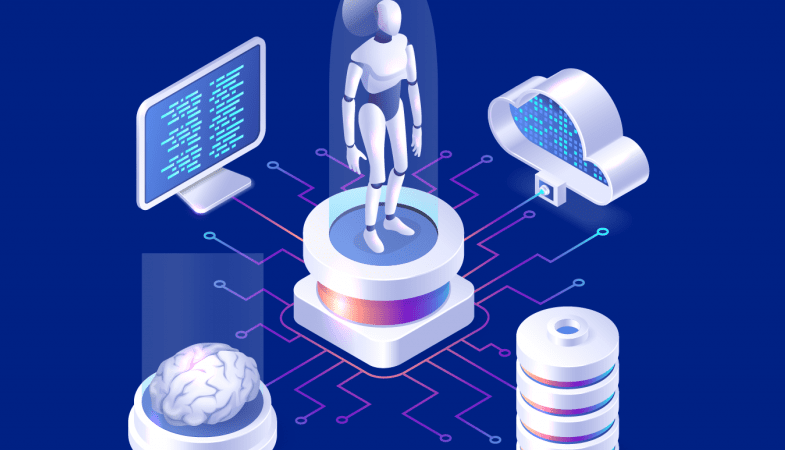Introduction to AI in Business: Unleashing the Power of Artificial Intelligence

Artificial Intelligence (AI) has rapidly evolved from a futuristic concept to a transformative force in the business world. In today’s competitive landscape, understanding the fundamentals of AI is essential for businesses looking to gain a competitive edge, enhance efficiency, and harness the potential of data-driven decision-making. In this article, we’ll embark on a journey to explore the basics of AI in business and uncover its profound impact on various industries.
What is Artificial Intelligence (AI)?
At its core, AI refers to the simulation of human intelligence in machines that can perform tasks typically requiring human intelligence. These tasks encompass learning, reasoning, problem-solving, perception, language understanding, and more. AI systems are designed to analyze data, identify patterns, and make decisions autonomously, often with impressive speed and accuracy.
The Evolution of AI in Business
AI’s journey in the business world has been marked by significant milestones and rapid advancements. Let’s delve into a brief overview of AI’s evolution:
- The Emergence of Machine Learning (ML): ML is a subset of AI that focuses on the development of algorithms and statistical models that enable computers to learn and improve their performance without explicit programming. It laid the foundation for many AI applications we see today.
- The Rise of Big Data: The availability of massive datasets and improved data storage capabilities became the driving force behind AI’s growth. Businesses can now extract valuable insights from large volumes of data, which is a fundamental aspect of AI applications.
- AI-Powered Tools and Software: The development of AI-powered tools and software opened up new possibilities for businesses. From chatbots and virtual assistants to predictive analytics and recommendation engines, AI applications have expanded across industries.
- Deep Learning and Neural Networks: Deep learning, a subset of ML, focuses on artificial neural networks that mimic the human brain’s structure and function. This technology has played a pivotal role in natural language processing, image recognition, and more.
Benefits of AI for Businesses
The integration of AI in business operations offers a multitude of advantages:
- Enhanced Decision-Making: AI analyzes data and generates insights that can inform strategic decisions, resulting in more informed and data-driven choices.
- Improved Customer Experiences: AI-driven chatbots, personalization, and customer service applications enhance customer interactions, making them more efficient and tailored.
- Increased Efficiency: AI in business automation of routine tasks and processes leads to improved operational efficiency, allowing employees to focus on higher-value tasks.
- Cost Reduction: AI in business can identify cost-saving opportunities, optimize resource allocation, and reduce operational expenses.
- Predictive Analytics: AI in business algorithms can predict future trends, customer behavior, and potential issues, allowing businesses to plan and strategize effectively.
Common AI Applications in Different Industries
AI’s applicability spans across a variety of industries, driving innovation and transformation:
- Retail: AI is used for inventory management, demand forecasting, and personalized shopping recommendations.
- Healthcare: In healthcare, AI aids in diagnostics, drug discovery, and patient care through telemedicine and health monitoring.
- Finance: AI-driven algorithms assess risk, detect fraudulent transactions, and optimize investment strategies.
- Manufacturing: Robotics and AI-powered machines streamline manufacturing processes, reducing errors and improving productivity.
- Marketing: AI assists in targeted advertising, customer segmentation, and content personalization.
- Transportation: AI enhances autonomous vehicles, traffic management, and logistics optimization.
- Education: AI offers personalized learning experiences, automated grading, and intelligent tutoring systems.
- The Future of AI in Business
As AI continues to advance, it is expected to play an even more significant role in shaping the future of business. Some key areas to watch include:
- AI Ethics and Regulation: The ethical use of AI and its impact on society and privacy will drive discussions and regulation.
- AI-Powered Creativity: AI-generated content, from art to music and literature, will challenge the boundaries of creativity.
- Quantum Computing and AI: Quantum computing will unlock new AI capabilities, solving complex problems at unprecedented speeds.
- Human-AI Collaboration: Businesses will see increased collaboration between humans and AI, enhancing productivity and decision-making.
- AI for Global Challenges: AI will be harnessed to address global challenges, such as climate change and healthcare crises.
conclusion
AI is no longer a distant concept; it’s a tangible and powerful tool that can revolutionize the way businesses operate. To stay competitive and innovative, businesses must embrace AI’s potential and continuously adapt to the evolving landscape. From improving decision-making to enhancing customer experiences and automating tasks, AI in business is a journey of transformation, and its impact is already being felt across industries. As we step into the AI-powered future, the possibilities are limitless, and the only limit is our imagination.






